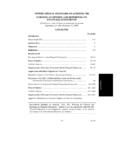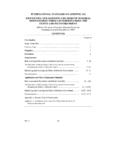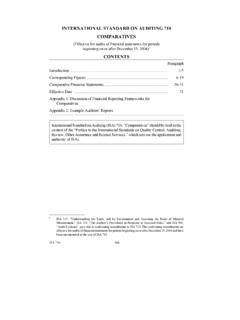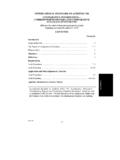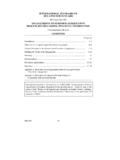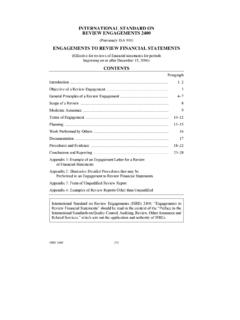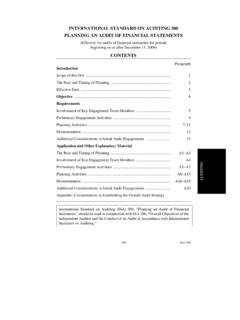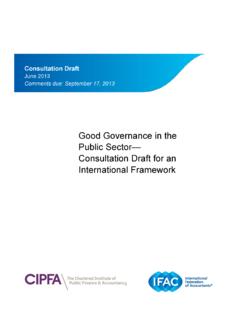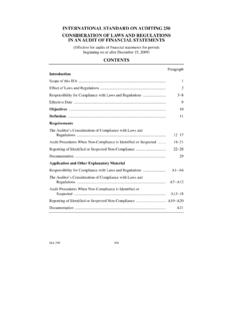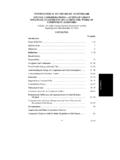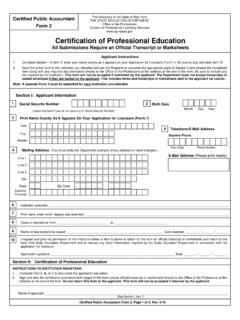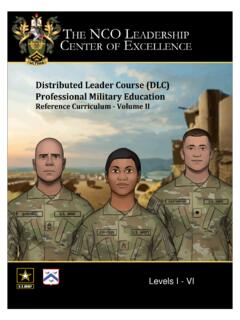Transcription of International Education Standard 8, Professional ...
1 Final Pronouncement October 2019 International Education Standard TM International Education Standard 8, Professional Competence For Engagement Partners Responsible For Audits Of Financial Statements (Revised) This document was developed and approved by the International Accounting Education Standards Board (IAESB ). The IAESB develops Education standards, guidance, and information papers on pre-qualification Education , training of Professional accountants, and continuing Professional Education and development. The objective of the IAESB is to serve the public interest by setting high-quality Education standards for Professional accountants and by facilitating the convergence of International and national Education standards. The structures and processes that support the operations of the IAESB are facilitated by the International Federation of Accountants (IFAC ). Copyright October 2019 by the International Federation of Accountants (IFAC).
2 For copyright, trademark, and permissions information, please see page 15. International Education Standard 8, Professional COMPETENCE FOR ENGAGEMENT PARTNERS RESPONSIBLE FOR AUDITS OF FINANCIAL STATEMENTS (REVISED) CONTENTS Paragraph Introduction Scope of this Standard .. 1 5 Effective Date .. 6 Objective .. 7 Requirements.. 8 9 Explanatory Material References to Definitions Contained within IAASB .. A1 Scope of this Standard .. A2 A16 Objective .. A17 A18 Requirements .. A19 A31 IES 8, Professional COMPETENCE FOR ENGAGEMENT PARTNERS RESPONSIBLE FOR AUDITS OF FINANCIAL STATEMENTS (REVISED) 4 Introduction Scope of this Standard (Ref: Para. A2 A16) 1. This International Education Standard (IES) prescribes the Professional competence that Professional accountants are required to develop and maintain when performing the role of an Engagement Partner responsible for audits of financial statements1. 2. This IES is addressed to International Federation of Accountants (IFAC) member bodies.
3 IFAC member bodies have a responsibility for the Continuing Professional Development (CPD) of Professional accountants, and for fostering a commitment to lifelong learning among Professional accountants. Under IES 7, Continuing Professional Development2 (Revised), IFAC member bodies require Professional accountants to develop and maintain Professional competence necessary to perform their role as a Professional accountant. IES 8, Professional Competence for Engagement Partners Responsible for Audits of Financial Statements (Revised) applies this IES 7 requirement to the role of an Engagement Partner. It is the responsibility of the Professional accountant performing the role of an Engagement Partner to develop and maintain Professional competence by undertaking relevant CPD activities, which include practical experience. 3. This IES is intended to be read in conjunction with Statement of Membership Obligations (SMO) 1 Quality Assurance, International Standard on Auditing (ISA) 220, Quality Control for an Audit of Financial Statements, and International Standard on Quality Control (ISQC) 1, Quality Control for Firms that Perform Audits and Reviews of Financial Statements, and Other Assurance and Related Services Engagements.
4 Together, these pronouncements place responsibilities on IFAC member bodies, Engagement Partners, and firms as part of the system of quality control for audits of financial statements. Also, in many jurisdictions, a regulator may have an oversight role in this system of quality control. Each of these stakeholders may have an impact on the Professional competence of the Engagement Partner. 4. IFAC member bodies or other stakeholders may also apply the requirements of this IES to Professional accountants performing an equivalent role to that of an Engagement Partner on audits of other historical financial information in compliance with the ISAs (or other relevant auditing standards) or other types of engagements providing assurance and related services. 5. Definitions and explanations of the key terms used in the IES and the Framework for International Education Standards for Professional Accountants and Aspiring Professional Accountants (2015) are set out in the International Accounting Education Standards Board (IAESB) Glossary of Terms (Revised).
5 Additional terms from the International Auditing and Assurance Standards Board (IAASB) pronouncements are also included in the Explanatory Material. Effective Date 6. This IES is effective from January 1, 2021. 1 For the purpose of this IES, hereafter referred to as Engagement Partner per the definition set out in International Standard on Auditing (ISA) 220, Quality Control for an Audit of Financial Statements, Para 7(a). 2 IES 7, Continuing Professional Development (Revised), Para. 9. IES 8, Professional COMPETENCE FOR ENGAGEMENT PARTNERS RESPONSIBLE FOR AUDITS OF FINANCIAL STATEMENTS (REVISED) 5 Objective (Ref: Para. A17 A18) 7. The objective of this IES is to establish the Professional competence that Professional accountants develop and maintain when performing the role of an Engagement Partner. Requirements (Ref: Para. A19 A31) 8. IFAC member bodies shall require Professional accountants performing the role of an Engagement Partner to develop and maintain Professional competence that is demonstrated by the achievement of learning outcomes including, but not limited to, those listed in Table A.
6 9. IFAC member bodies shall require Professional accountants performing the role of an Engagement Partner to undertake CPD that develops and maintains the Professional competence required for this role. Table A: Learning Outcomes for the Professional Competence of an Engagement Partner Competence Areas (IES 8) Learning Outcomes (a) Audit (i) Lead the audit through active involvement during all phases of the audit engagement. (ii) Lead the identification and assessment of the risks of material misstatement. (iii) Develop an audit plan that responds to the risks of material misstatement identified. (iv) Evaluate responses to the risks of material misstatement. (v) Conclude on the appropriateness and sufficiency of all relevant audit evidence, including contradictory evidence, to support the audit opinion. (vi) Evaluate whether the audit was performed in accordance with International Standards on Auditing or other relevant auditing standards, laws, and regulations applicable to an audit of the financial statements.
7 (vii) Develop an appropriate audit opinion and related auditor s report, including a description of key audit matters as applicable. (b) Financial accounting and reporting (i) Evaluate whether an entity has prepared, in all material respects, financial statements in accordance with the applicable financial reporting framework and regulatory requirements. (ii) Evaluate the recognition, measurement, presentation, and disclosure of transactions and events within the financial statements in accordance with the applicable financial reporting framework and regulatory requirements. IES 8, Professional COMPETENCE FOR ENGAGEMENT PARTNERS RESPONSIBLE FOR AUDITS OF FINANCIAL STATEMENTS (REVISED) 6 Competence Areas (IES 8) Learning Outcomes (iii) Evaluate accounting judgments and estimates, including fair value estimates, made by management. (iv) Evaluate the fair presentation of financial statements relative to the nature of the business, the operating environment, and the entity s ability to continue as a going concern.
8 (c) Governance and risk management (i) Evaluate corporate governance structures and risk assessment processes affecting the financial statements of an entity as part of the overall audit strategy. (d) Business environment (i) Analyze relevant industry, regulatory, and other external factors that are used to inform audit risk assessments including, but not limited to, market, competition, product technology, and environmental requirements. (e) Taxation (i) Evaluate procedures performed to address the risks of material misstatement in the financial statements in respect of taxation, and the effect of the results of these procedures on the overall audit strategy. (f) Information and communications technologies (i) Evaluate the information and communications technologies (ICT) environment to identify controls that relate to the financial statements to determine the impact on the overall audit strategy. (g) Business laws and regulations (i) Evaluate identified or suspected non-compliance with laws and regulations to determine the effect on the overall audit strategy and audit opinion.
9 (h) Finance and financial management (i) Evaluate the various sources of financing available to, and financial instruments used by, an entity to determine the impact on the overall audit strategy. (ii) Evaluate an entity s cash flow, budgets, and forecasts, as well as working capital requirements to determine the impact on the overall audit strategy. (i) Interpersonal and communication (i) Communicate effectively and appropriately with the engagement team, management, and those charged with governance of the entity. (ii) Evaluate the potential impact of cultural and language differences on the performance of the audit. (iii) Resolve audit issues through effective consultation when necessary. IES 8, Professional COMPETENCE FOR ENGAGEMENT PARTNERS RESPONSIBLE FOR AUDITS OF FINANCIAL STATEMENTS (REVISED) 7 Competence Areas (IES 8) Learning Outcomes (j) Personal (i) Promote lifelong learning. (ii) Act as a role model to the engagement team.
10 (iii) Act in a mentoring or coaching capacity to the engagement team. (iv) Promote reflective activity. (k) Organizational (i) Evaluate whether the engagement team, including auditor s experts, collectively has the appropriate objectivity and competence to perform the audit. (ii) Manage audit engagements by providing leadership and project management of engagement teams. (l) Commitment to the public interest (i) Promote audit quality and compliance with Professional standards and regulatory requirements with a focus on protecting the public interest. (m) Professional skepticism and Professional judgment (i) Apply Professional judgment in planning and performing an audit and reaching conclusions on which to base an audit opinion. (ii) Promote the importance of the application of Professional skepticism during all phases of the audit engagement. (iii) Apply Professional skepticism to critically assess audit evidence obtained during the course of an audit and reach well-reasoned conclusions.
